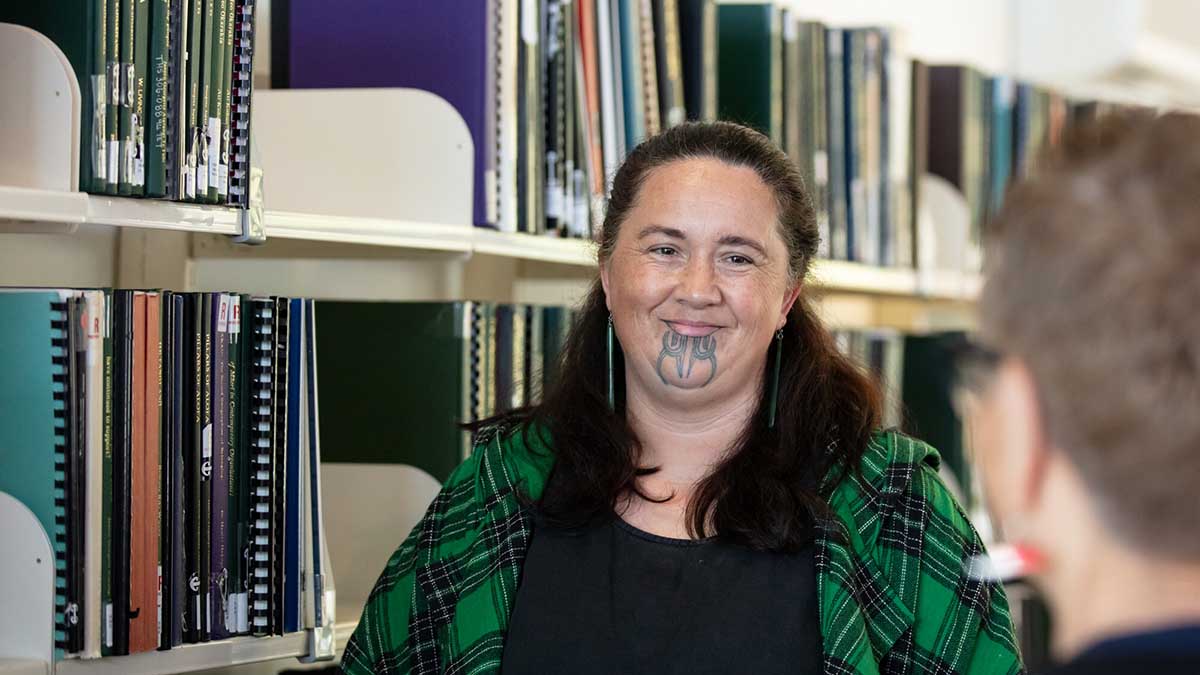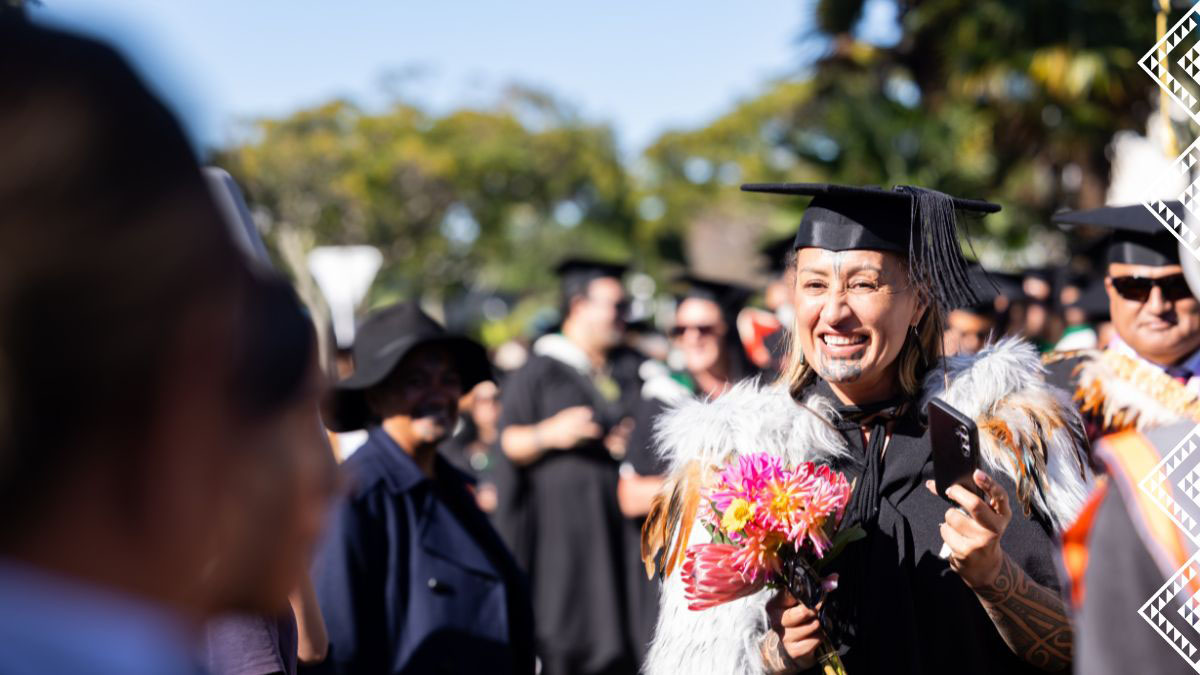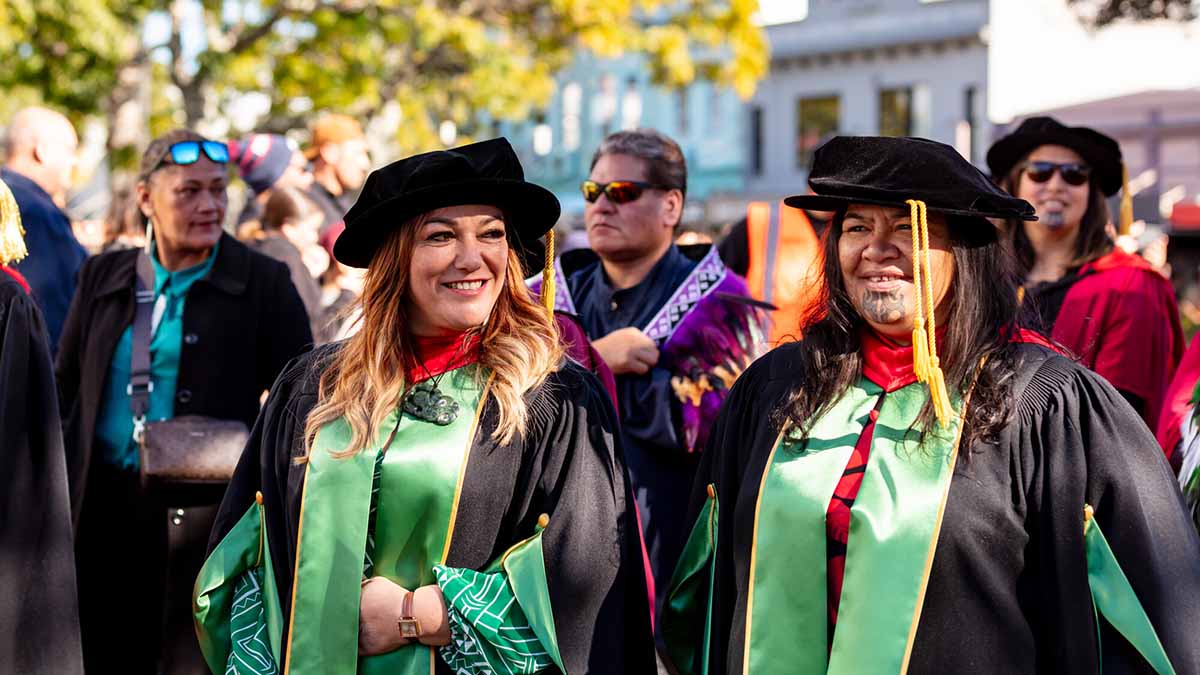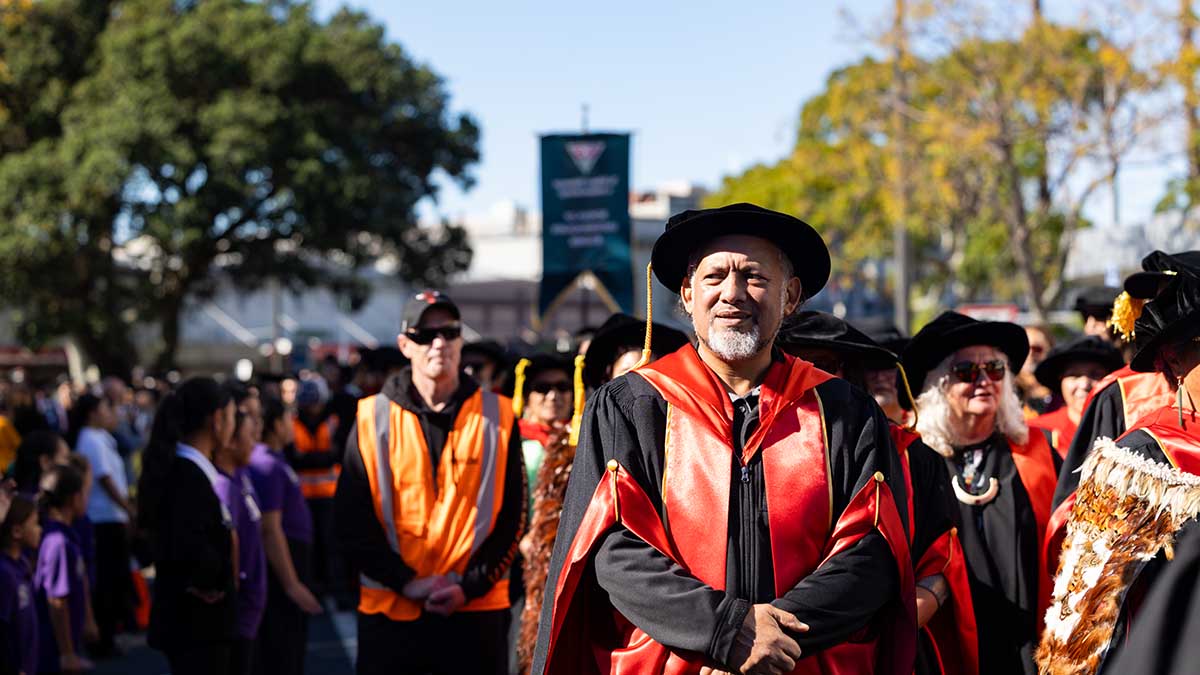Postgraduate Diploma in Mātauranga Māori and Indigenous Studies
Postgraduate Diploma in Mātauranga Māori and Indigenous Studies Pourewa Mātauranga Māori me ngā iwi Taketake
Explore Māori and indigenous knowledge. Uplift communities and influence policy and practice across Aotearoa and beyond.
Take your understanding of Māori and indigenous knowledge systems to the next level with the Postgraduate Diploma in Mātauranga Māori and Indigenous Studies at Te Whare Wānanga o Awanuiārangi.
This diploma offers a compelling academic and cultural journey for those seeking to deepen their engagement with Māori and indigenous knowledge systems, histories, and futures.
It’s ideal for professionals, educators, researchers, and community leaders who are committed to indigenous advancement in Aotearoa and beyond.
Grounded in kaupapa Māori values, the programme examines indigenous ways of knowing and being as well as examining other frameworks in both Aotearoa and globally.
Equip yourself to uplift your whānau and hapori, whether it be in your current work or in preparation for higher levels of study. Join a community of indigenous thinkers, leaders, and knowledge holders.
Why choose the Postgraduate Diploma in Mātauranga Māori and Indigenous Studies?
Māori and Indigenous Knowledge at the Core
Explore mātauranga Māori in depth alongside global indigenous philosophies and knowledge systems.
Postgraduate-Level Depth
Build advanced skills in indigenous theory, critical research, and cultural leadership. Expand your understanding beyond certificate level.
Advance Your Career and Study Pathway
Prepare for master's or PhD study, or elevate your impact in education, policy, iwi development, the public sector or other relevant field.
Flexible, Blended Delivery
Designed for busy professionals, whānau and community. Study through a mix of online learning, in-person wānanga, and independent research.
What you’ll learn in the Postgraduate Diploma in Mātauranga Māori and Indigenous Studies?
- Advanced principles of mātauranga Māori and indigenous knowledge
- Indigenous research methodologies and ethical frameworks
- Critical analysis of cultural identity
- Revitalisation of te reo Māori, tikanga, and indigenous practices
- Application of indigenous knowledge in areas such as education, policy, economic development and leadership
Who should apply?
- People who work or aspire to work in education, policy, iwi development, or cultural advisory roles
- Those who have completed a bachelor’s degree and/or the Postgraduate Certificate in Mātauranga Māori and Indigenous Studies
- Those passionate about Māori and indigenous advancement and knowledge
Dates
Sem 1: Feb to Jun 2026, Sem 2: Jul to 19 Dec 2026Duration
There are 20 weeks per semester with each paper a semester in duration. Tauira are required to complete four papers in total. Some papers are run part-time across two semesters – this will be noted in course offeringsCommitment
Blended learning including noho, wānanga, tutorials, lectures, online learning and self-directed learningApplications close
Sem 1: Feb 2026, Sem 2: Jul 2026Locations
Whakatāne, Tāmaki Makaurau, Online/Blended (Based on demand)Requirements
View link for detailsPathway to
View link for detailsFees
2026 Tuition Fee: $1800.00 per paper (note fees are updated annually)-
Please note: Offerings for 2026 are still being finalised. We hope to have these updated soon.
To be awarded the qualification Pourewa Mātauranga Māori me nga Iwi Taketake: Postgraduate Diploma in Mātauranga Māori and Indigenous Studies, tauira must complete and pass the three core papers listed under the endorsement selected and one elective paper, four papers in total (a total of 120 credits)2025 Course Paper Offerings
PGMMI803: Contemporary Māori/Indigenous Policy Development (30 credits)
- Description: This paper will critically examine and critique the conceptual frameworks and applications of policy development across a range of settings and experiences as it relates to Māori and or Indigenous advancement. Moreover, this paper will provide tauira with culturally appropriate theoretical and practical policy frameworks for successful engagement within Māori and or Indigenous best practice organisational settings.
-
PGMMI804 – Te Reo o Ngā Tohunga (30 credits)
Description: This paper examines and gives Reo and English analysis, interpretation, inquiry of advanced Māori oral and written literature relevant to Mātaatua Waka; whānau, hapū and iwi-marae wānanga. This paper brings together relevant, enduring literature to support the oral traditions of knowledge legacy of marae-tikanga protocols and etiquette to ensure marae-tikanga within the whānau, hapū and iwi knowledge is sustainable into the future. Key concepts of teaching practice include the oral traditions of whaikōrero (formal speech) and karanga (ceremonial calls), whakatauāki (proverbs), pepeha (tribal sayings), karaipiture, (biblical passages), tauparapara (chants), mōteatea (sung poetry) kōrero tuku iho (inherited stories) and kōrero paki (creative amusing stories). Tauira will be expected to research, compile and present their own whānau, hapū and iwi oral and written literature in written form and present seminar discussion samples to support their Reo academic revitalisation aspirations. Students enrolling in this course should note that a high degree of Māori language proficiency is essential to succeed. Students must be able to operate successfully in an immersion Māori learning and teaching environment and are expected to submit assignments in te reo Māori.
PGMMI805: Te Reo o te Mōteatea (30 credits)
- Description: This core subject of this paper is mōteatea. Mōteatea will be examined in the reo and english in terms of its analysis, interpretation, inquiry of advanced Māori oral and written literature relevant to Mātaatua Waka; whānau, hapū and iwi-marae wānanga-mōteatea. Traditional and contemporary mōteatea contains insightful poetic commentaries, philosophies, values, biographies, prophetic identities, quotes, biblical passages, historical literature that explain complex views on a range of important and endure knowledge issues. Tauira will be expected to research, compile and present whānau, hapū and iwi mōteatea oral and written literature in written form and seminar presentation outlines to support mōteatea revitalisation aspirations. Students enrolling in this course should note that a high degree of Māori language proficiency is essential to succeed. Students must be able to operate successfully in an immersion Māori learning and teaching environment and are expected to submit assignments in te reo Māori.
PGMMI806: Te Whakarauora (30 credits)
- Description: The purpose of this paper is to provide in te reo Māori an interpretation, analysis, an examination of the highly ornate oral and written literature contained in the ceremonial performance of karanga and whaikōrero. Within the performance of karanga and whaikōrero other ritualised narratives such as poroporoaki (farewell calls), whenua (land) combined with ā-whanau, ā-hapū, ā-iwi experience come to the fore. Students enrolling in this course should note that a high degree of Māori language proficiency is essential to succeed. Students must be able to operate successfully in an immersion Māori learning and teaching environment and are expected to submit assignments in te reo Māori.
PGMMI811: Advanced Māori/Indigenous Economic Development (30 credits)
- Description: In this paper, tauira will gain an understanding of the complexities of balancing competing or complementary economic influences facing Māori and or indigenous communities. More specifically it will examine traditional and contemporary notions of economic development, as well as relevant theory, and its application in Māori and or indigenous contexts. Furthermore, this paper will provide tauira with theoretical frameworks and future-oriented solutions, which will enable them to develop, apply and implement economic development models for strategic planning and advancement within Māori and or indigenous settings.
PGMMI812: Contemporary Māori/Indigenous Policy Development (30 credits)
- Description: This paper will critically examine and critique the conceptual frameworks and applications of policy development across a range of settings and experiences as it relates to Māori and or Indigenous advancement. Moreover, this paper will provide tauira with culturally appropriate theoretical and practical policy frameworks for successful engagement within Māori and or Indigenous best practice organisational settings.
PGMMI816: Kaitiakitanga (30 credits)
- Description: This paper examines definitions of kaitiakitanga. It looks at issues surrounding the concept for Māori and how these issues are managed in the modern day. Tauira will be expected to present a point of view and debate the varying perspectives Māori may have about kaitiakitanga. Individuals, committees, iwi, hapū or marae may all give varying weights to the importance of whanau; preservation or conservation of land; being economically viable; stewardship; guardianship; dividends to shareholders; reinvestment; benefiting now; these and other issues will be explored and debated through the examination of selected case studies.
PGMMI821: Te Tapere nui ā-Whatonga (30 credits)
- Description: This paper provides a post-graduate level introduction to the various methods and genre of Māori storytelling. This paper will also explore the origins and evolution of Māori storytelling and its importance to the identity of whānau, hapu and iwi. The paper familiarizes tauira with a range of Māori storytelling techniques, styles, mediums and language with the aim of developing an in-depth understanding of the skill set and knowledge base required to create pakiwaitara or pūrākau (Māori storytelling or narration). This paper will assist in developing the various genres of te reo pōhewa (creative language) and its application and significance to the art of Māori storytelling.
PGMMI822: Mana Wahine Leadership (30 credits)
- Description: This paper will undertake research where Māori women’s leadership contributes to Māori and Indigenous Peoples’ self-determination. Mana Wāhine underpins Māori women’s leadership theories, principles and practices. ‘Herstories’ are used to examine Māori women’s discourses of mātauranga wāhine, tikanga Māori, the politics of difference and diverse realities that affirm Mana Wāhine leadership.
PGMMI828: Research Methodologies and Methods (30 credits)
- Description: This paper will prepare tauira for the research component required for further postgraduate study. Tauira will become aware of a range of ethical considerations informing future projects of research they may undertake and will develop familiarity with associated research jargon.
PGMMI829: Tā te Māori Rangahau Kōrero (30 credits)
Description: Ko te ngako o te kaupapa nei he wānanga i ngā tūāhuatanga o te rangahau mō te hunga kei te tuhituhi ki te reo Māori, kei te whai hoki i te tirohanga Māori. Ka āta tirohia te āhua o ngā putunga rangahau a te Māori, mō te Māori anō, i tuhia ki te reo Māori, i whāi rānei i ngā tikanga a te Māori hei huarahi rangahau mā rātou e mārama ai te āhua o tā te Māori tāna rangahau kōrero. Ko te tikanga ia he āta wānanga i ngā whare kōrero, i ngā marae kōrero, i ngā pātaka kōrero o te Māori, ngā āhuatanga i kīia ai te Māori he iwi whai tikanga, he kawa anō ōna hei āhuatanga rangahau māna. Ka mutu ko te reo Māori te tāhuhu o te kaupapa nei. Māna e kōkiri, māna anō e hua ai te ora o te mātauranga, o te wānanga, o te rangahau ki te whai ao, ki
- te ao mārama. Me mōhio ki te kōrero me te tuhituhi i roto i te reo Māori
IHI805: Special Topic (30 credits)
- Description: This course allows for a special area of study to be offered by a visiting lecturer or invited lecturer with a strong background in a given area of academic study. The lecturers for this course will be suitably qualified to the level of Masters. The offering of this option will depend on the availability of visiting lecturers. The visiting lecturer will develop a course outline directly related to their academic area of expertise in consultation with a designated representation of Graduate studies staff. Consideration also will be given to areas of valid demand identified among Masters students. This paper is a flexible course drawing on the experience and knowledge base of a recognised lecturer.
IHI806 Selected Topics (30 credit)
- Description: This course enables students to study in-depth selected topics from the field of Indigenous Studies or Māori Studies through a programme of readings, seminars and directed research. Students will be supervised by a lecturer in whose area they are studying. The student will produce a research-based project as part of their assessment.
- Papers marked with * indicates students can choose to enrol in this paper as a single semester course full-time, or as a double semester course part-time.
Postgraduate Pathways
Whakapā mai/Contact us
Assoc. Prof Miriama Postlethwaite
- Phone: 027 306 1627
- Email: miriama.postlethwaite@wananga.ac.nz
Awanui Perese
- Phone: 07 306 3346 or 027 587 1491
- Email: awanui.perese@wananga.ac.nz
Interested? Make an enquiry
We will email you an info pack



